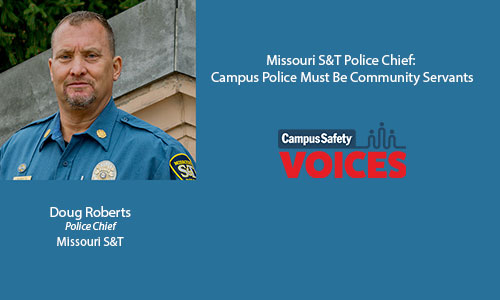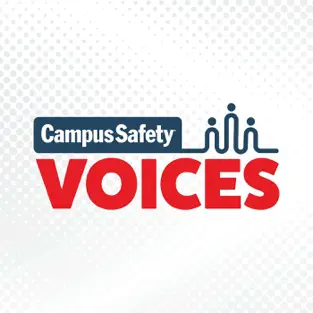A community servant is someone who cares about the needs of others rather than the desire to have power. For Douglas Roberts, that’s why he got into policing.
“As law enforcement, in general, we have to let people know that we care about them and we’re here to help first,” said Roberts, police chief at Missouri University of Science and Technology (Missouri S&T) and a 2022 Campus Safety Director of the Year finalist. “You don’t go into the field of law enforcement for pay — you go into because you want to be servants to the society in the community that you serve.”
Roberts has transferred the model of community policing to Missouri S&T, working to ensure the public has confidence in the department and also bringing the public into contact with the department on a daily basis (1:51). One way this has been accomplished is through the department’s Campus Service Officers (CSO) Program, which employs students part-time. The program started with five or six student employees and has since expanded to about 45.
“We’re bringing in students from our Greek organizations, bringing students from our athletic programs, bringing students that have no affiliation at all and are just here to study,” Roberts said of the diversity within the program. “So then you have immediate relevancy within that student population. That’s community policing — bringing the students to be a part of our department and the buy-in that it provokes.”
For the students that aren’t interesting in policing, Roberts ensures he and his officers are regularly involved in campus life through various activities, including participating in student fundraising and speaking at international student events. Missouri S&T police also host fun activities, including “Cocoa with the Popo,” dunk tanks, and pie-in-the-face booths.
[promo_content slug=”2022-campus-safety-director-of-the-year-winner-announcement-at-csc”]
Roberts urges his officers to engage with students constantly, not only when there is an issue. When officers do run into relatively minor issues with a student, he encourages them to make it a “teachable moment” (10:29).
“We may not take minor infractions to the criminal justice system — we may take them to our student affairs and let them sanction,” said Roberts. “I think that also shows the students that it’s not about always writing tickets and making arrests — sometimes it’s about connecting people with resources and getting them help.”
Roberts also recognizes the importance of maintaining relevance in surrounding communities, especially among local first responders (20:42). He is part of a community crisis intervention team and sits on boards for a local community health center and drug task force team.
Since the campus houses several large venues, the department recently hosted a National Threat Assessment Seminar presented by the U.S. Secret Service. The department has also hosted a tabletop exercise depicting a flu epidemic. The exercise involved community hospital personnel, the health department, local police, and the sheriff’s department, among others, which proved beneficial when the coronavirus pandemic hit in March 2020.
Roberts has also established relationships with the State Emergency Management Agency (SEMA) and the Federal Emergency Management Agency (FEMA), allowing him to secure PPE for his officers during the height of the pandemic.
“When I can show our relevance and our benefit in the community, then when I have a problem, those same people that I’ve been helping out are going to be much more likely to be here and be of support,” said Roberts.
Roberts spoke about several other impressive accomplishments, including:
- How technology has acted as a force multiplier in building confidence in the department (12:08)
- How his Secret Service background has helped him succeed in his current role (27:19)
Watch our full interview here or listen on the go on Apple or Spotify.









